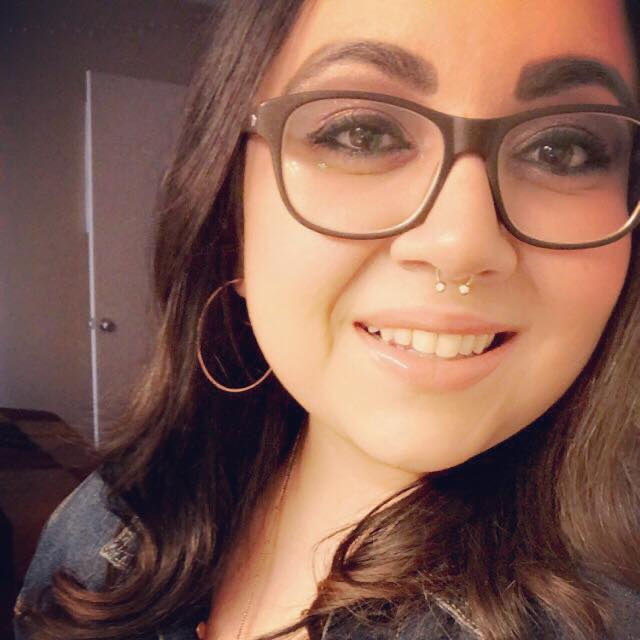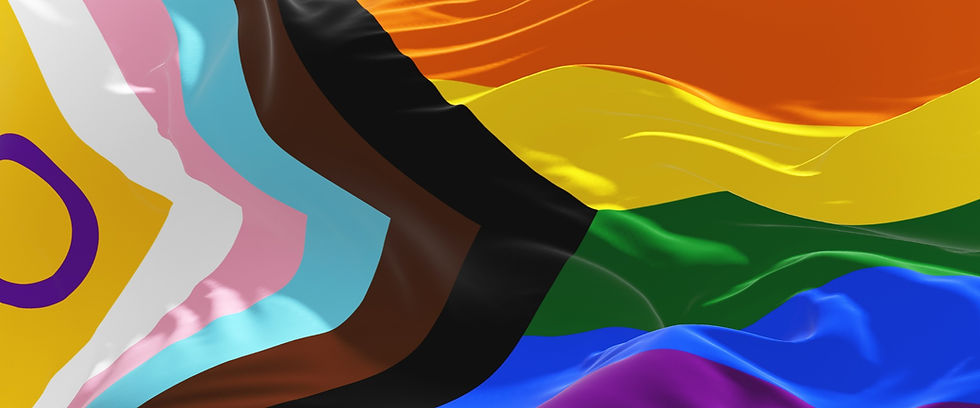September is National Suicide Prevention Awareness Month
- Borderland Rainbow Center

- Sep 24, 2020
- 6 min read
Guest Blog by MSW intern Laura Ayala
*Trigger Warning* This blog post contains discussions about suicide. If you or someone you know is going through a difficult time or is experiencing a crisis, please see the resources provided below or call 911.

It is known that suicide is responsible for approximately 45,000 deaths per year in the United States alone, and nearly 800,000 deaths globally each year. In the U.S., suicide is the 10th overall leading cause of death and the 2nd leading cause of death among ages 10-34.
As high as these rates are, they are still very much underreported due to the stigma and myths surrounding mental health issues, which prevents many people from reaching out and seeking help. In fact, 90% of those who died by suicide in 2018 had a diagnosable mental health condition at the time of their death. Understanding the risk factors and warning signs to suicidal behavior could help to reduce the rates to both suicide attempts and deaths by suicide.
What are some common warning signs of suicide?
Warning signs can be obvious and clear, but can also be vague or even unnoticable to some. Understanding these can mean the difference between life and death. Some of the common warning signs that a person is suicidal include:
Making verbal threats or comments of hurting or killing oneself, such as “I want to die” or “I’m going to kill myself.”
Seeking methods for self-harm or killing oneself, such as seeking access to firearms, pills, or other means
Frequently talking or writing about death, dying, or suicide, especially if this is out of character for the person
Changes in personality or mood, such as angry outbursts
Depression
Giving away personal/prized possessions
Alcohol or substance use
High-risk behaviors
Expressing feeling hopeless, worthless, helpless, or fear of becoming a burden
Prior suicide attempts
Withdrawing from others
Changes in their physical appearance
Lack of interest in the future
Putting final affairs in order
What can I do to help someone that might be suicidal?
If you’re concerned about someone you know, have noticed significant changes, or something feels different or wrong, trust your instincts and reach out. One of the most common myths is that asking someone if they’re considering suicide will encourage or lead to a suicide attempt. This myth is a result of the stigma attached to mental health issues and suicide, which causes many people to be afraid of talking about suicide. The reality is that starting a dialogue about suicide can start to reduce stigma, but also allow a safe space for those struggling with suicidal thoughts to share their thoughts and feelings, process their internal struggles, and seek help. Another question to address if someone is considering suicide is asking whether they have a plan or method of hurting themselves, discussing ways to safely get rid of any means, such as a firearm, other weapons, and disposing of drugs, etc., then helping them to seek or access appropriate resources.
What are some societal changes that need to happen to help with suicide prevention and reducing stigma?
Eliminating stigma is essential in suicide prevention. There are many harmful effects that result from stigma, including bullying, physical violence or harassment, inadequate health care coverage for mental health treatment, barriers in job opportunities, school, and housing, unwillingness or hesitation in seeking treatment, lack of understanding by family, friends, colleagues, or others, and significant impairment in an individual’s self-esteem and outlook.
Understanding and advocating for mental health issues can help bring awareness of what mental illness is and why suicide occurs. There are many campaigns and resources that are currently available to further our education about mental health concerns and for individuals struggling with mental illness and/or suicidal thoughts or behaviors.
However, this is not enough. Change needs to occur at the legislative level for suicide rates to begin decreasing. Public policy concerns should continue to focus on early intervention, improvement in mental healthcare, and diversion from the involvement of the criminal justice system. One legislative factor that needs to be addressed that could help with suicide prevention is gun reform. Limiting access to firearms and having more in-depth background checks could potentially reduce the rates of suicide. In 2018, 50% of all suicide deaths were a result of firearms.
Disparities and access to mental healthcare need to be addressed and improved. Further, disparities in healthcare for the LGBTQ+ community must be addressed. There has been some research focused on suicide rates and patterns within the LGBTQ+ community, and it is apparent that there are many intersectional factors that contribute to suicide. The following statistics can be found on the website for Suicide Awareness Voices of Education (SAVE):
Lesbian, gay, and bisexual kids are 3x more likely than straight kids to attempt suicide at some point in their lives.
Medically serious attempts at suicide are 4x more likely among LGBTQ youth than other young people.
African American, Latino, Native American, and Asian American people who are lesbian, gay, or bisexual attempt suicide at especially high rates.
41% of trans adults said they had attempted suicide, in one study. The same study found that 61% of trans people who were victims of physical assault had attempted suicide.
Lesbian, gay, and bisexual young people who come from families that reject or do not accept them are over 8x more likely to attempt suicide than those whose families accept them.
Each time an LGBTQ person is a victim of physical or verbal harassment or abuse, they become 2.5x more likely to hurt themselves.
Organizations such as the National Alliance on Mental Illness (NAMI), Mental Health America (MHA), the American Foundation for Suicide Prevention (AFSP), and many more have institiuted various campaigns and initiatives to help bring awareness to mental health issues and suicide prevention. Changes in public policy can contribute to improved access to mental health services, improvement in treatment, and better outcomes for individuals with mental health disorders. The creation of specialized teams within police agencies that are specific to responding to crisis calls or incidents regarding individuals with a mental health disorder is an improvement in assuring that mental illness is not treated as a crime.
Finally, one of the most recent bills that passed Senate on May 13, 2020 is the National Suicide Hotline Designation Act of 2020. This bill appoints 9-8-8 as the universal phone number for a national suicide and mental health crisis hotline. Additionally, this bill calls for efficient and specific services that adhere to high-risk populations, such as LGBTQ+, minorities, and rural individuals. The Federal Communications Commission is estimated to have 9-8-8 active as the universal number for the National Suicide Prevention Lifeline beginning July 2022. To read more about this bill, visit: https://www.congress.gov/bill/116th-congress/senate-bill/2661.
Additional federal bills supported by NAMI can be found at https://www.nami.org/Advocacy/Advocate-for-Change.
As a society, we shouldn’t avoid speaking up about mental illness, seeking treatment, or fear talking about suicide. Suicide prevention begins with starting a dialogue, educating ourselves, and advocating for mental health and suicide prevention awareness within our communities.
Start a conversation. End the stigma.
**MENTAL HEALTH RESOURCES:
Local/El Paso, TX
Crisis Hotline: 915-779-1800
Toll-Free Crisis Hotline: 1-877-562-6467
National Resources
National Suicide Prevention Lifeline: 1-800-273-8255
Veterans Crisis Line: Dial 1-800-273-8255 and Press 1 to talk to someone or send a text message to 838255 to connect with a VA responder.
Crisis Text Line: Text TALK to 741741 to text with a trained counselor for free
The Trevor Project (LGBTQ+)
TrevorLifeline: 1-866-488-7386
TrevorText: Text TREVOR to 1-202-304-1200
TrevorChat: Via www.thetrevorproject.org
TWLOHA: Connect to mental health resources in your community: twloha.com/find-help
Seize the Awkward: Having a conversation about mental health might be uncomfortable, but it can make all the difference. Click the link for tools, like conversation guides & tips, that can help you help those in need. (https://seizetheawkward.org/)
My3 App: Define your network and your plan to stay safe. This app can help you be prepared to reach out to others when you are having thoughts of suicide. (https://my3app.org/)
References
American Foundation for Suicide Prevention, (2020). Suicide Statistics. Retrieved from https://afsp.org/.
National Alliance on Mental Illness, (2020). Policy Priorities. Retrieved from https://www.nami.org/Advocacy/Policy-Priorities.
Suicide Awareness Voices of Education, (2020). Retrieved from https://save.org/.

Laura was born and raised in El Paso, TX. She shares "I graduated from Texas A&M University with a B.A. in Psychology and a minor in Sociology. I volunteered over 600 hours combined for the Student Counseling Helpline and the Sexual Assault Resource Center while completing my undergraduate education. I am currently a first-year graduate student pursuing my MSW from New Mexico State University. I am passionate about advocating for various marginalized communities, which is one of the many reasons I chose to pursue a career in social work. I have been working in the mental health field for almost 2 years, initially as a caseworker for adults. I recently began a new position, in which my primary goal will be to ensure clients are receiving quality services to accomplish well-rounded health by bridging the gap between clients' mental health and physical/medical health."



